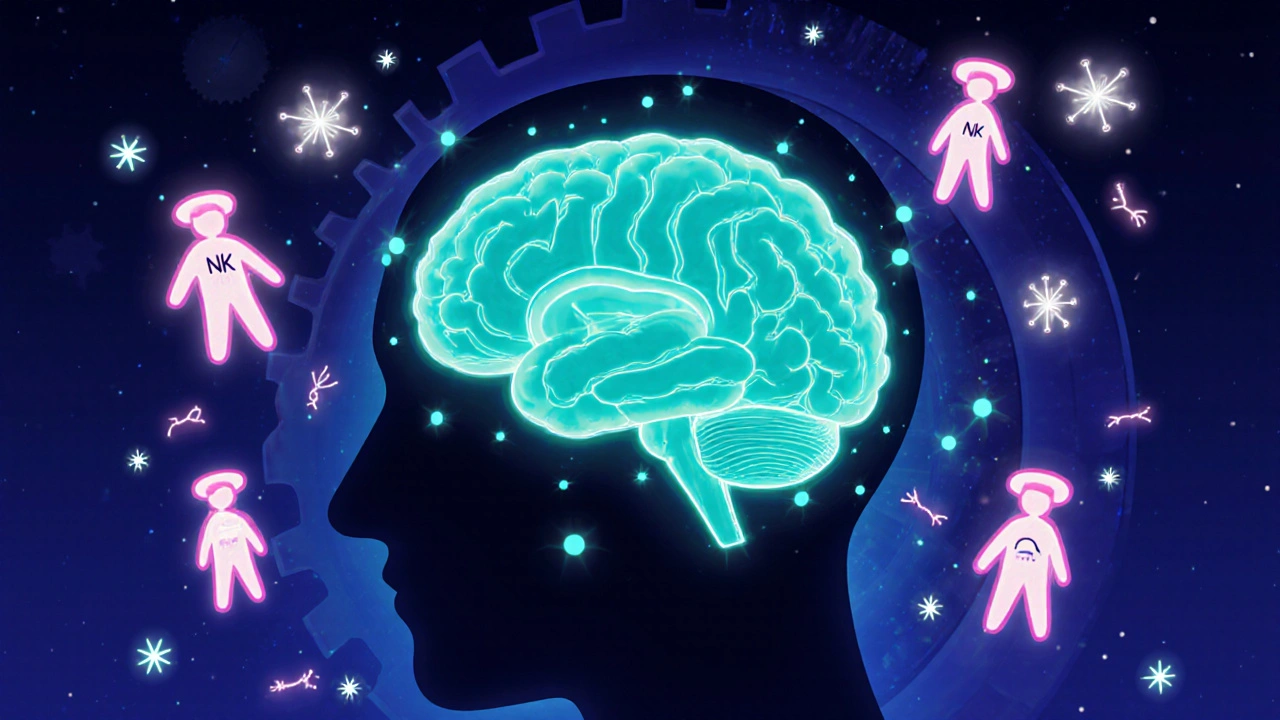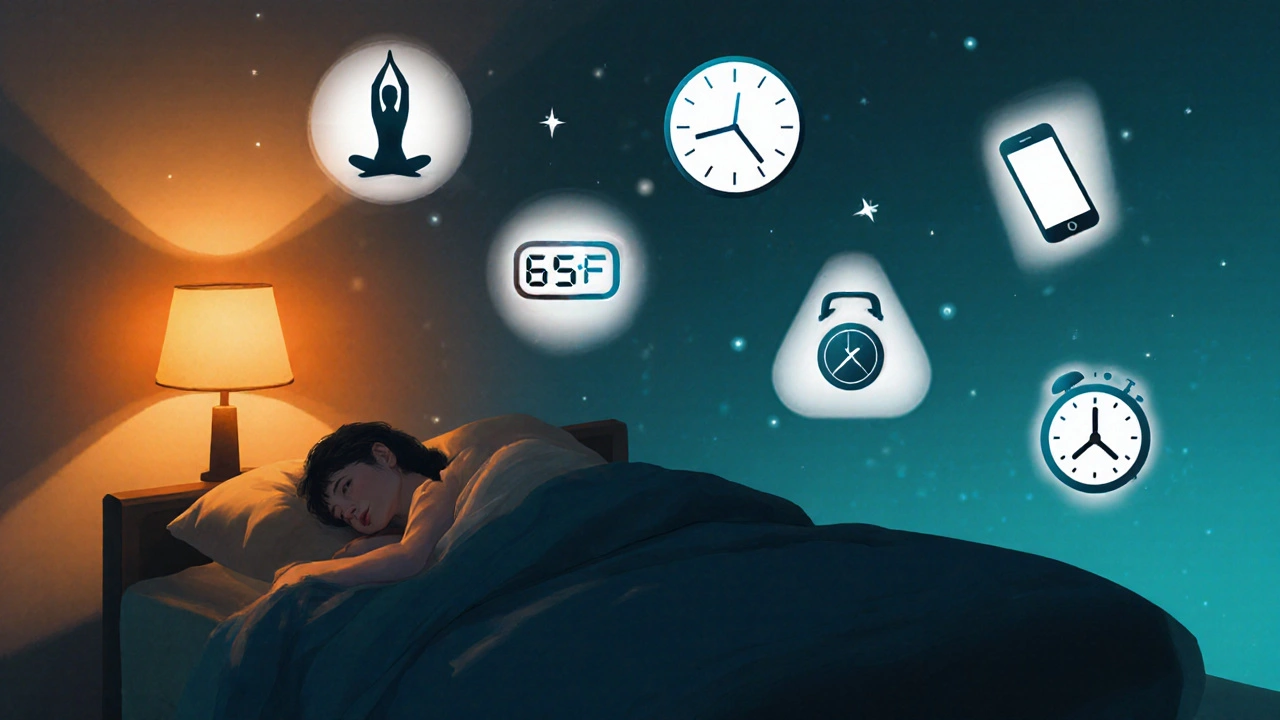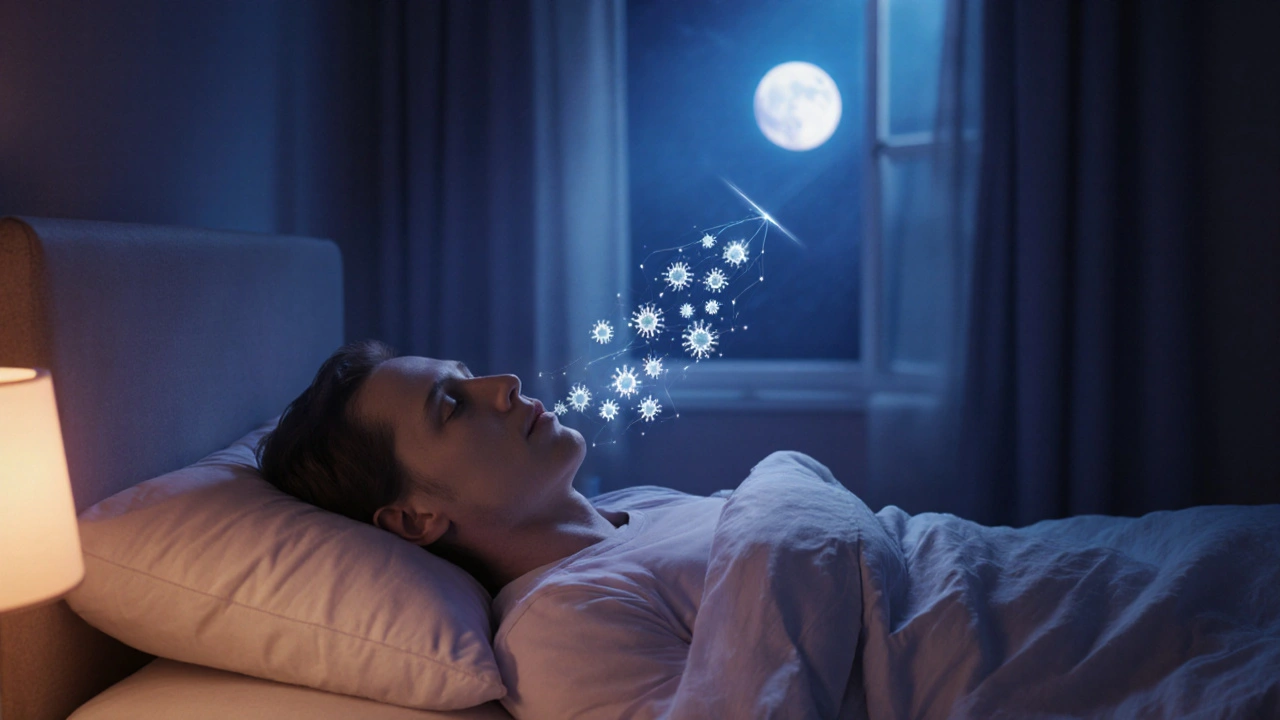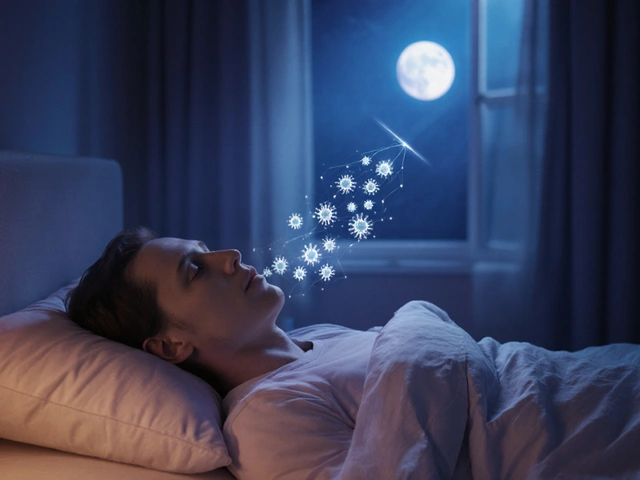Sleep Duration & Immune Function Calculator
How Much Sleep Do You Need?
Enter your average nightly sleep duration below to see how it impacts your immune system function.
Your Immune System Report
Ever wonder why a good night’s rest feels like an instant reboot? That’s not just a feeling - it’s science. Quality sleep and immunity are tightly linked, and missing out can leave your body vulnerable to everything from a common cold to more serious infections. Below we break down exactly how snoozing supports your body’s defense crew and give you practical steps to turn bedtime into a health‑boosting habit.
How Sleep Regulates Immune Cells
Sleep is a natural restorative process that occurs in cycles, each lasting about 90 minutes, and is essential for the maintenance of physiological balance. During the deeper non‑REM stages, the body ramps up production of White Blood Cells, the foot soldiers of the Immune System, which patrol the bloodstream looking for invaders. Studies using actigraphy and blood draws show a 20‑30% increase in circulating lymphocytes after a full night of sleep compared to a night of fragmented rest. This surge means your body is better equipped to spot viruses before they take hold.
Hormones & Cytokines: The Chemical Messengers
While you’re dreaming, your brain releases a cocktail of hormones that act as signals for immune activity. One key player is Cytokines, small proteins that coordinate inflammation and infection response. During deep sleep, pro‑inflammatory cytokines such as interleukin‑6 (IL‑6) dip, allowing the immune system to reset, while growth‑promoting cytokines like IL‑7 rise, supporting the generation of new immune cells.
Another hormone, Cortisol, often called the stress hormone, follows a diurnal rhythm that peaks in the early morning and falls at night. Low nighttime cortisol levels prevent the immune system from being over‑activated, reducing chronic inflammation that can otherwise wear down defenses.

Circadian Rhythm, Melatonin, and Nightly Defense
The internal clock - known as the Circadian Rhythm - orchestrates sleep timing, hormone release, and immune cell migration. When this rhythm aligns with natural light‑dark cycles, the pineal gland secretes Melatonin, a hormone that not only signals sleep but also exhibits antioxidant properties. Melatonin directly boosts the activity of natural killer (NK) cells, which are crucial for early‑stage virus clearance.
Disrupting the circadian rhythm-by night‑shifts or late screen time-dampens melatonin production and skews cytokine patterns, leaving the immune system less responsive.
Effects of Sleep Deprivation on Infection Risk
Missing just a few hours can have measurable consequences. A controlled trial with 100 volunteers found that participants restricted to 4 hours of sleep for six consecutive nights showed a 70% increase in typical cold symptoms after exposure to rhinovirus, compared to a well‑rested control group.
Sleep loss also impairs the efficacy of vaccines. Research tracking influenza vaccination responses showed a 40% reduction in antibody titers among people who slept less than 5 hours the night before and after the shot.
Beyond infections, chronic sleep deprivation fuels Inflammation, a silent driver of heart disease, type 2 diabetes, and even certain cancers. Elevated C‑reactive protein (CRP) levels have been consistently observed in sleep‑restricted adults, indicating a higher baseline inflammatory state.
Practical Tips for Better Sleep to Strengthen Immunity
- Stick to a consistent bedtime and wake‑time, even on weekends; this reinforces your circadian rhythm.
- Dim lights and switch off screens at least 30 minutes before bed - blue light suppresses melatonin.
- Keep your bedroom cool (around 65°F / 18°C) and dark; a comfortable environment promotes deeper non‑REM sleep.
- Include a brief relaxing routine - gentle stretching, reading, or meditation - to lower cortisol before sleep.
- Avoid caffeine after noon and limit alcohol, which fragments REM sleep.
- Consider a short, 20‑minute nap if nighttime sleep is insufficient; napping can partially restore cytokine balance.
By integrating these habits, most adults can aim for the sweet spot of 7‑9 hours per night, which research cites as optimal for immune health.

Comparison: Sleep Duration vs. Immune Outcomes
| Hours of Sleep | Typical Cytokine Profile | Infection Risk (Relative) | Vaccine Antibody Response |
|---|---|---|---|
| 5 or less | Elevated IL‑6, lowered NK activity | ↑ 70% | ↓ 40% |
| 6‑7 | d>Balanced IL‑6, moderate NK activity↑ 30% | ↓ 15% | |
| 7‑9 (recommended) | Optimal IL‑7, high NK activity | Baseline | Peak response |
| 10+ | Potential rise in inflammatory markers | ↑ 10% | Comparable to 7‑9 |
Quick Checklist for Immune‑Boosting Sleep
- 💤 Aim for 7‑9 hrs nightly.
- 🕒 Keep a regular sleep‑wake schedule.
- 🔅 Dim lights 30 mins before bed.
- 🌡️ Room temperature ~65°F.
- 🚫 No caffeine after 12p.m.; limit alcohol.
- 🧘♀️ Use a wind‑down routine to lower cortisol.
Frequently Asked Questions
Can a single night of poor sleep affect my immune system?
Yes. Even one night of 4‑hour sleep can temporarily reduce natural killer cell activity and raise inflammatory cytokines, making you more susceptible to infections that night and the next.
Do naps help improve immunity?
Short naps (15‑20 minutes) can restore alertness and partially rebalance cytokine levels, but they don’t replace the benefits of a full night’s sleep. Longer naps that enter deep sleep may actually interfere with nighttime rest.
How does shift work impact immune health?
Irregular schedules disrupt the circadian rhythm, leading to lower melatonin production and higher nighttime cortisol. This combination raises chronic inflammation and decreases vaccine effectiveness by up to 30%.
Is there a link between sleep and autoimmune diseases?
Poor sleep is associated with increased activity of pro‑inflammatory cytokines, which can exacerbate conditions like rheumatoid arthritis and lupus. Improving sleep quality often reduces flare‑up frequency and severity.
What role does melatonin supplementation play?
Melatonin can help reset the sleep‑wake cycle for shift workers or travelers, indirectly supporting immunity. However, its direct immune‑boosting effects are modest; the primary benefit comes from achieving consistent, quality sleep.



Shelby Rock
October 6, 2025 AT 14:57Sleep isn't just a nightly pause; it's a portal to the deeper rhythms that stitch our bodies together. When we close our eyes, the immune system quietly rehearses its defense‑dance, syncing with the circadian beat. In a world that glorifies hustle, embracing those hours can feel like a quiet rebellion against the noise.
Dhananjay Sampath
October 11, 2025 AT 19:57Absolutely, getting those 7‑9 hours is a cornerstone of health; it fuels not only the adaptive immune response, but also regulates inflammatory pathways, thereby reducing chronic disease risk; moreover, a consistent sleep schedule supports mental clarity, emotional stability, and overall well‑being, so prioritize it like you would any essential habit.
kunal ember
October 17, 2025 AT 00:57The relationship between sleep duration and immune function has been the subject of numerous epidemiological studies, each contributing incremental insights into the underlying mechanisms; researchers have observed that individuals who consistently obtain the recommended 7‑9 hours of sleep per night exhibit higher concentrations of circulating natural killer (NK) cells, which are pivotal in the early containment of viral infections; conversely, those restricted to less than six hours often demonstrate attenuated NK cell cytotoxicity, rendering them more susceptible to opportunistic pathogens; one plausible explanation lies in the influence of sleep on cytokine production, particularly interleukin‑6 (IL‑6) and tumor necrosis factor‑alpha (TNF‑α), both of which modulate inflammatory responses; during restorative sleep phases, especially slow‑wave sleep, the body experiences a downregulation of these pro‑inflammatory mediators, thereby creating a more balanced immunological environment; additionally, melatonin, the hormone predominantly secreted in darkness, possesses immunomodulatory properties that enhance the proliferation of T‑lymphocytes and bolster antibody production; the cumulative effect of these processes is a more vigilant immune surveillance system poised to respond efficiently to challenges; beyond cellular metrics, sleep also impacts the adaptive arm of immunity, influencing the generation of high‑affinity antibodies post‑vaccination, as demonstrated by reduced seroconversion rates in sleep‑deprived cohorts; longitudinal data further suggest that chronic sleep insufficiency may accelerate immunosenescence, the gradual decline of immune competence associated with aging; this phenomenon is particularly evident in older adults who experience fragmented sleep architecture, leading to diminished vaccine efficacy; experimental manipulations in controlled settings have reinforced these observations, where acute sleep restriction resulted in measurable decrements in both innate and adaptive markers within 24 to 48 hours; meanwhile, strategic napping, limited to 20‑30 minutes, can partially recuperate alertness and modestly restore cytokine equilibrium, though it does not replace the comprehensive benefits of nocturnal sleep; environmental factors, such as ambient temperature, exposure to blue light, and stress levels, further modulate sleep quality, thereby indirectly affecting immune resilience; it is also noteworthy that over‑sleeping, defined as consistently exceeding ten hours, may paradoxically elevate certain inflammatory markers, suggesting a U‑shaped relationship between sleep duration and immune health; therefore, maintaining a balanced sleep window appears essential for optimal immunological function; finally, integrating good sleep hygiene practices-regular bedtimes, darkened rooms, and limited caffeine intake-serves as a pragmatic approach to support both sleep and immune health, creating a virtuous cycle that benefits overall well‑being.
Kelly Aparecida Bhering da Silva
October 22, 2025 AT 05:57The mainstream media loves to downplay how sleep deprivation is being weaponized against our citizens, especially when foreign powers push agendas that erode national strength; by neglecting proper rest, we create a populace vulnerable to illness, making us easy targets for bio‑terror tactics; it's no coincidence that policy makers ignore sleep hygiene while pushing endless work hours, effectively weakening our immune defenses for geopolitical gain.
Alex Iosa
October 27, 2025 AT 09:57It is a moral imperative to recognize that adequate sleep is not a luxury but a fundamental right, essential for the preservation of public health; societies that fail to safeguard this basic need are complicit in the erosion of collective immunity, thereby endangering vulnerable populations.
melissa hird
November 1, 2025 AT 14:57Oh, brilliant, because obviously the best way to boost our immune systems is to binge‑watch shows until 3 a.m and hope the body will “adapt” – a truly revolutionary approach that no one has ever tried, right?
Mark Conner
November 6, 2025 AT 19:57America needs real sleep, not this globalist nonsense.
Charu Gupta
November 12, 2025 AT 00:57From a linguistic standpoint, the phrase “sleep duration & immune function” should be rendered without the ampersand; proper conjunction enhances readability, and, as a side note, maintaining consistent verb tense throughout the article would improve coherence 😊.
Abraham Gayah
November 17, 2025 AT 05:57Well, the article tries so hard to sound scientific, yet it barely scratches the surface of the profound interplay between somnolence and immunology, leaving the reader with a half‑baked summary that feels more like a publicity brochure than rigorous analysis.
rajendra kanoujiya
November 22, 2025 AT 10:57Honestly, I think the whole sleep‑immune link is overstated; plenty of people thrive on irregular schedules, so why treat seven‑plus hours as a universal prescription?
Caley Ross
November 27, 2025 AT 15:57I've noticed that when I stick to a consistent bedtime, my cold symptoms seem milder, which suggests a subtle but real connection between routine sleep and how my body fends off viruses.
Bobby Hartono
December 2, 2025 AT 20:57While many folks tend to overlook the significance of a good night's rest, it's worth highlighting that even modest adjustments-like dimming the lights an hour before bed, avoiding caffeine after noon, and setting a regular wake‑up time-can cumulatively enhance the body's natural defense mechanisms, thereby fostering a more resilient community where everyone benefits from shared health improvements.
George Frengos
December 8, 2025 AT 01:57Investing in proper sleep hygiene is a proactive step toward safeguarding one's health, and I encourage readers to view these recommendations as an integral component of a holistic wellness plan.
Jonathan S
December 13, 2025 AT 06:57From an ethical perspective, neglecting sleep hygiene is tantamount to self‑sabotage; it not only compromises personal well‑being but also places unnecessary strain on healthcare resources, and, ultimately, it undermines our collective responsibility to protect one another 😊; therefore, prioritizing restorative sleep should be embraced as a civic duty, reflecting a commitment to communal health.
Charles Markley
December 18, 2025 AT 11:57The epistemological framework underpinning somnological impact on immunological homeostasis necessitates a paradigm shift away from reductionist narratives toward a systems‑level articulation of psychoneuroimmunology, thereby reconceptualizing sleep as a pivotal node within the integrative health matrix.
L Taylor
December 23, 2025 AT 16:57Hey, just a quick reminder that a regular sleep schedule can do wonders for your immune system